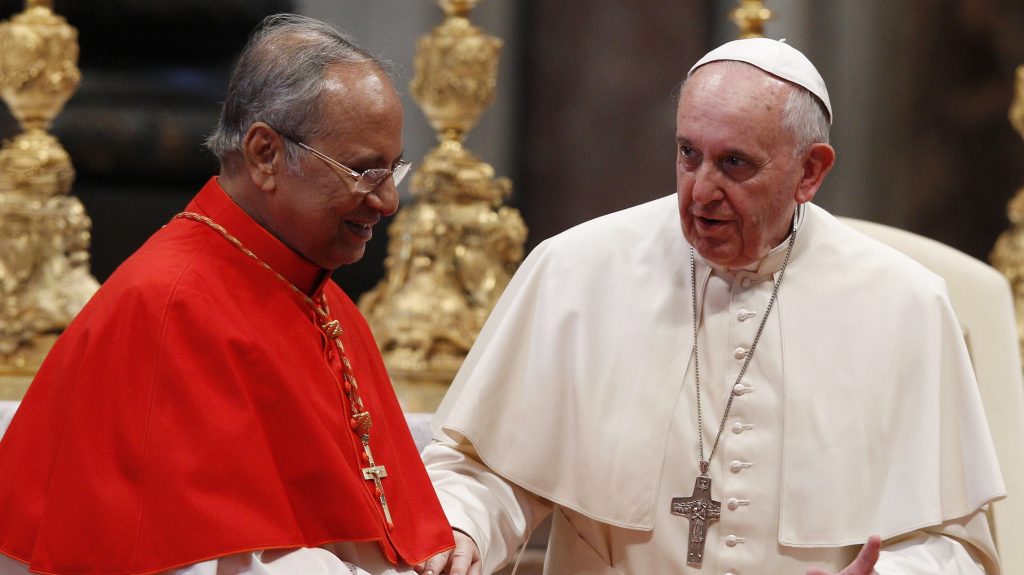In the run-up to at least the last two papal elections, speculation swirled on many fronts, with one of the most popular talking points being whether a candidate from Africa was a live possibility.
For whatever reason, the prospect of a “black pope” seems to excite the global imagination – even though Catholic insiders may insist that we’ve actually had a “black pope” for centuries in the person of the Superior General of the Society of Jesus, i.e., the Jesuits.
Whenever the next conclave may occur, the question is likely to present itself again: Could there be an African pope?
For whatever such guesswork is worth, here’s my answer: Of course an African pope is possible, but right now, if you’re trying to think outside the box, I’d say Asia is a better bet.
Let’s begin with the “of course an African’s possible” part.
Just as the election of John Paul II in 1978 shattered the Italian monopoly on the papacy, the choice of Francis in 2013 ended the era of the European hold on the Throne of Peter. In an era of social mobility and instantaneous internet communication, the pope could come from anywhere.
In the abstract, many cardinals probably would find the idea of electing an African attractive. It would be a vivid demonstration of the church’s solidarity with the developing world, it would be a powerful statement against racism, and it would also be a recognition of the growth and dynamism within African Catholicism.
The problem, as ever, is that one doesn’t elect popes in the abstract. You need a concrete, flesh-and-blood candidate, and looking around today, it’s not clear who that would be. The African favorite the last time around, Cardinal Peter Turkson of Ghana, is now retired from his Vatican post as prefect of the Dicastery for Promoting Integral Human Development.
Similarly, Cardinal Robert Sarah of Guinea is also gone as prefect of the erstwhile Congregation for Divine Worship. While Turkson would appeal to progressive cardinals and Sarah to conservatives looking for a course correction, it’s not clear either man could command a two-thirds majority.
Many of the other Africa cardinals aren’t sufficiently well known outside their own contexts, such as Cardinal Fridolin Ambongo of Congo or Cardinal Antoine Kambanda of Rwanda. Granted, that could change if enough time passes between now and whenever the next election may take place.
However, even if a conclave were to happen today, there are several Asian cardinals who’d probably be on the “A lists” of many papal handicappers.
To begin with, there’s Cardinal Luis Antonio “Chito” Tagle, currently co-leader of the new Dicastery for Evangelization. Tagle was also considered a candidate last time around, but a decade ago he was in his mid-50s and many cardinals may not have been in the mood for another long papacy. Today he’s 65, and he’s also perceived as a charismatic, popular public figure, a personally humble man who would charm the world. Broadly speaking, Tagle would appeal to the “continuity” vote in the next conclave, meaning cardinals who want to continue the approach of Pope Francis.
The major question mark about Tagle probably is whether he’s strong enough for the job, given his “nice guy” persona. On the other hand, after a decade of what’s been perceived as an extremely decisive papacy, a candidate who might augur a bit more calm, and thus less turbulence, could be attractive.
Next up is Cardinal Malcolm Ranjith of Sri Lanka, who turns 75 in November.
He has extensive Vatican experience, having served in the Congregation for the Evangelization of Peoples, as the pope's nuncio to Indonesia and East Timor, and then as Secretary for the Congregation of Divine Worship. He also studied in Rome at the Urban University and is proficient in Italian. That background would appeal to cardinals who believe that one of the next pope’s main tasks will be continuing the reform of the Roman Curia launched by Francis.
Ranjith would be a strong candidate among more conservative cardinals. In Rome he was known as the “little Ratzinger,” in part for his short physical stature but also due to his perceived closeness to Pope Benedict XVI. He also gets high marks for his leadership of the church in Sri Lanka during that country’s various political crises.
One also has to consider Cardinal Charles Bo of Myanmar, who turns 74 on Oct. 29. He’s got experience of the global church as a member of the worldwide Salesian order, and enjoys the respect of his fellow prelates in Asia who elected him as president of the Federation of Asian Bishops’ Conferences in 2018.
Choosing Bo also would be a statement of solidarity with persecuted Christians around the world, since the church in Myanmar faces a whole series of restrictions and challenges, as well as a recognition of Bo’s shrewd maneuvering in the wake of the country’s military coup. Although Catholics are a tiny minority in Myanmar, Bo has emerged as the country’s most important religious voice.
As an outside possibility, there’s also Cardinal Lazzaro You Heung-sik of South Korea, currently head of the Vatican’s Dicastery for Clergy. He’s the first Korean to head a Vatican department, and an old Rome hand after studying at the Pontifical Lateran University. He’s also got an international base of support as a close friend of the Focolare movement.
You Heung-sik isn’t as familiar as the other three Asians mentioned above, but as head of the Dicastery for Clergy he’s got ample opportunity to win friends and influence people.
So, to sum up: If the question simply is whether an African pope is possible, then the answer is “sure.” If you’re looking for a realistic Third World runner, on the other hand, you may want to look a bit farther east.

